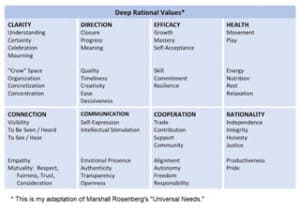In my previous article, I recommended that you have a value orientation toward your past actions even if you made a mistake.
If you’re feeling bad about something that happened in the past, there is something to learn about it and something to heal. Emotions only arise when there is a value at stake now.
For example, many people have noticed that they may feel fear before something bad happens, but the fear ends once they are in the bad situation. That’s because it is a done deal. Emotions are always about the future. Their purpose is to alert you to values at stake for you in this moment. They are values that you know about, care about, and can influence now. Your action right now will make a difference in whether you gain or keep them.
This is true even if the emotions seem to be about something in the past. For example, here is a story that bothered me for 30 years before I sorted out the values involved:
One day when I was working as an engineer at the Starfire Optical Range, a co-worker asked me what I had done on the weekend. I told her it had been quiet. That statement was based on the memories that had popped up. I’d spent a lot of time at home in study, preparing to enter graduate school in the fall. But that wasn’t all I had done that weekend. Later that day, I ran into another co-worker and I suddenly remembered I had done more than just study that weekend.
He had taken me for a ride in his vintage airplane.
It was a canvas-covered biplane suitable for aerial tricks. He did only the tamer tricks for me because I was a scaredy cat. What I remember most vividly are the beginning and the ending. Before we got into the plane, he pricked the canvas with a pin to make sure the material was still strong. Canvas-covered wings can disintegrate suddenly in the air if the material has rotted. That’s not a good thing. In the air, after he tooled me around and showed me some tricks, we came in over the end of the runway at an altitude of 100 feet.
He then deliberately stalled the plane and we fell straight down onto the tarmac.
I had been in a 2-seater single prop plane many times, but I had never landed like that before! It was a surprisingly soft, controlled landing. Plus the excitement of free fall. It was a memorable adventure.
So why didn’t I instantly remember this when I was asked about the weekend? I could speculate why, but it doesn’t matter. I could have retrieved that information if I had systematically reviewed the events of the weekend. If I had thought of it, I am sure I would have shared the story at the time. But it did not occur to me spontaneously. It just didn’t.
I recall being thrown into conflict over whether I should go back and correct my misstatement to my co-worker. Would it be awkward to correct it? Would she read something into my having gone on this adventure with him? Had he mentioned the plane ride to her? Had she already seen the disconnect? Had she or would she tell him that I hadn’t mentioned it? Would his feelings be hurt? Were his feelings already hurt? Was I making too big a deal of this? If I went back to correct the story, would that be making too big a deal of it?
This is the kind of social muddle I used to get myself into before I learned how to identify the values at stake in social situations. It was such a muddle in my mind that I just gave up. I did not say anything. I let sleeping dogs lie. And yet it bothered me for 30 years.
Recently I decided to put it to bed by figuring out what was still at stake for me. To help with this, I consulted my list of deep rational values. Here is this list, which I introduced briefly in this article.
The short explanation of this list is this: Everyone has a value system. Some of these values are concrete: your loved ones, your hobbies, your personally meaningful work projects. Other values are abstract. The most fundamental of these are what I call deep rational values. They are rational in that you can make the logical case that they are in principle good to have in life. And they are deep in that they are the “what for” for many lesser values. Clarity, Direction, and Efficacy are all values concerning your mind. Health and Rationality concern life per se. Connection, Cooperation, and Communication concern social values.
Looking back at that awkward situation, I consulted this list to see what still mattered to me. I didn’t think it was an issue of honesty. It’s not dishonest to make a mistake. And you’re under no moral imperative to correct a misimpression.
The social values were what still concerned me. Looking back, what I think I wanted most was to connect better with both co-workers. I wished I could have created camaraderie over the incident. Once I recognized that’s what I wanted, I immediately saw how I could have gotten it. I wish I had caught my two co-workers in a casual moment and made a joke out of my forgetting about the plane ride. I imagine we three would have had a short friendly conversation about the flight and how much fun it was. And we would have laughed over my not thinking of it.
Why didn’t I figure this out 30 years ago? Because I was totally focused on the downside — the threats. I didn’t know that I needed to orient to values or how to do so. I didn’t know what I wanted.
And here’s the kicker: I still want it. I wish I had made that push for comradeship at the time and I still wish for it. I decided to try to get this article to my two co-workers when it comes out, and hope they laugh about it now. Or if my worst fears were true, and I’ve hurt someone’s feelings, I trust this will help repair the damage.
In the past 30 years I have remembered that incident at least a dozen times and fretted over how I handled it. It’s only now, having identified the biggest value at stake, that my feelings have shifted. I completely understand why I didn’t know how to handle it then, plus I see how I could have handled it. And I see something I can do right now to gain that same value.
By taking my feelings seriously and identifying the values at stake, I have transformed some old baggage into a learning event. I have an example in my mind of how focusing on values helps you be creative. I have an example in mind of how much better I am at handling awkward social sitautions. And I have an example of putting to rest a 30-year-old issue.










I sure enjoyed this piece and will attempt to introspect on values more.
Thanks, Mari Paz!